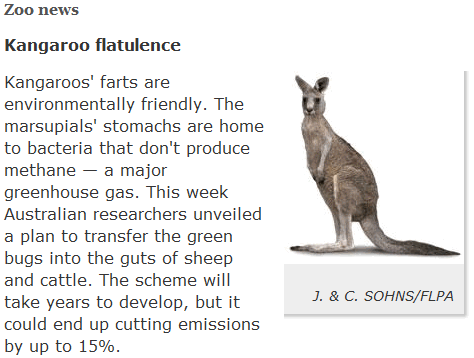|
News & Views item - December 2007 |
![]() Will Australian Science and the Kangaroo Help Save the Planet?
(December 13, 2007)
Will Australian Science and the Kangaroo Help Save the Planet?
(December 13, 2007)
It's not really a recent revelation, but with recent progress it's now made the pages of the journal Nature.
With Australia's new Prime Minister pushing for the nation to gain top green credentials it just may be worthwhile to bring it to the attention of Senator Carr as Minister for Science and Research and Ms Gillard as Minister for the universities to suggest that science is a good thing and worthy of proactive support.
Almost two years ago (February 2006) Dr Athol Klieve, a senior research
scientist in microbial biotechnology at Queensland's Department of
Primary Industry pointed out: "When you ferment grass in the stomach
like kangaroos do, they produce hydrogen, and you have to get rid of
that hydrogen, or it slows down and stops the fermentation of the
material...The production of methane is one solution to the problem of
getting rid of hydrogen [but] there are alternative mechanisms of
getting rid of it. One is to produce acetate [which] is used by the
animal as a major part of its energy resources. Weíve been able to
isolate a number of species of bacteria that do take hydrogen through to
acetate and itís those bacteria that we hope to be able to move across
to sheep and cattle, to bring down the methane emissions in sheep and
cattle"
In addition farmers could save feed money. Dr Klieve continued:
"Methane is actually a loss of feed energy. Itís an inefficient use of
feed. If instead of [venting] methane to the atmosphere and causing
greenhouse problems, its converted to something like acetate, thatís
more energy available for the animal for growth and production."
And Nature's take:

Were research efforts world-wide to be focused on replacing the methane producing bacteria residing in mammalian ruminants with acetate producing substitutes the 25% to 40% target by 2020 could have a useful leg up.